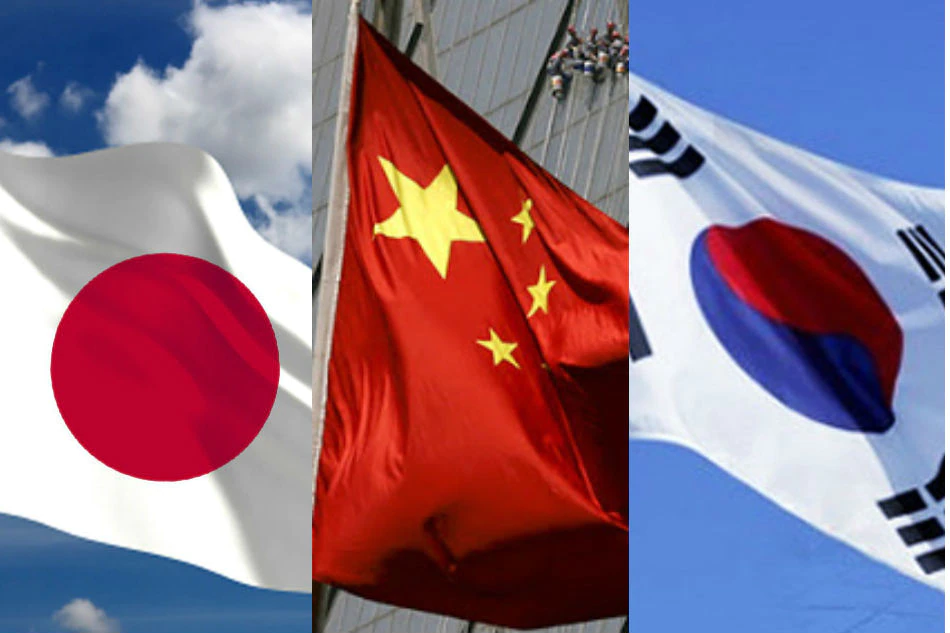The foreign ministers of China, Japan, and South Korea are scheduled to convene in South Korea on Sunday with the aim of reinvigorating cooperation between the Asian neighbours and facilitating a trilateral summit.
Beijing is worried that Washington and its main regional allies are growing their three-way relationship, even if China and the US have been patching up their poor relations, which included a summit between Presidents Xi Jinping and Joe Biden last month.
To improve diplomatic and commercial relations, Beijing, Tokyo, and Seoul had decided to hold yearly summits starting in 2008. However, the plan has been derailed by bilateral disagreements and the COVID-19 epidemic. 2019 saw the trilateral leaders’ summit, which was their most recent one.
Importance of the trilateral leaders’ summit
For the first time since 2019, the three senior diplomats are getting together in Busan, South Korea. In September, senior officials from the three nations agreed to have a trilateral summit at the “earliest convenient time.”
Source: Yonhap news
On Sunday morning, South Korean Foreign Minister Park Jin had separate meetings with Chinese Foreign Minister Wang Yi and Japanese Foreign Minister Yoko Kamikawa. According to a statement from Seoul’s foreign ministry, Park and Kamikawa denounced North Korea for launching its first spy satellite last week and agreed to step up their responses to military transfers between Pyongyang and Moscow.
By calling a South Korean court’s order for Japan to compensate a group of women forced to work in Japanese wartime brothels “extremely regrettable,” Kamikawa marred the cooperative tone. The South Korean court was asked to take appropriate measures- as reported by a Japanese news source.
Kamikawa met Wang on Saturday and said he hoped Beijing and Tokyo would have security talks “shortly.” According to China’s foreign ministry, Wang emphasized the necessity for all parties to make sure that every party should keep in mind the other’s legitimate concerns for a more in-depth partnership.
In an effort to heal the rifts caused by past transnational conflicts and economic disputes, South Korean President Yoon Suk Yeol and Japanese Prime Minister Fumio Kishida convened a historic trilateral summit with Biden in August. Wang issued a warning in July, saying that US efforts to improve ties with Tokyo and Seoul would lead to more conflict and instability in the area.
Meeting in the midst of South Korea’s concern
On Wednesday, North Korea claimed that it launched a spy satellite into orbit, asserting the country’s capability to develop a space-based surveillance system. The country has existing border problems with South Korea and Japan. The increasing US intervention in its surroundings has not been seen in a favourable position by Pyongyang. The claim made by the North could not be independently verified right away. Spectators question if the satellite is sufficiently sophisticated to conduct military reconnaissance.
Source: Trans conflict
Seoul announced that it was suspending the agreement’s clause limiting its military’s ability to conduct reconnaissance and surveillance operations along the militarized border with North Korea, in response to Pyongyang’s Tuesday night satellite launch. Pyongyang responded by withdrawing from the agreement. Due to North Korea’s record-breaking number of missile and other weapon tests since last year, tensions on the Korean peninsula have further increased as the two nations’ distance from one another has grown.
Park requested that the Chinese foreign minister enhance cooperation between their nations in such a situation, explaining to Wang that his nation’s decision to temporarily halt the agreement was merely a minimal defensive move against a regime in North Korea that was becoming more aggressive. According to a foreign ministry official who spoke with reporters, Park asked China to “play a constructive role, as it is in the common interests of South Korea and China that North Korea stop its provocations and take the path of denuclearization,” according to a local news agency.
